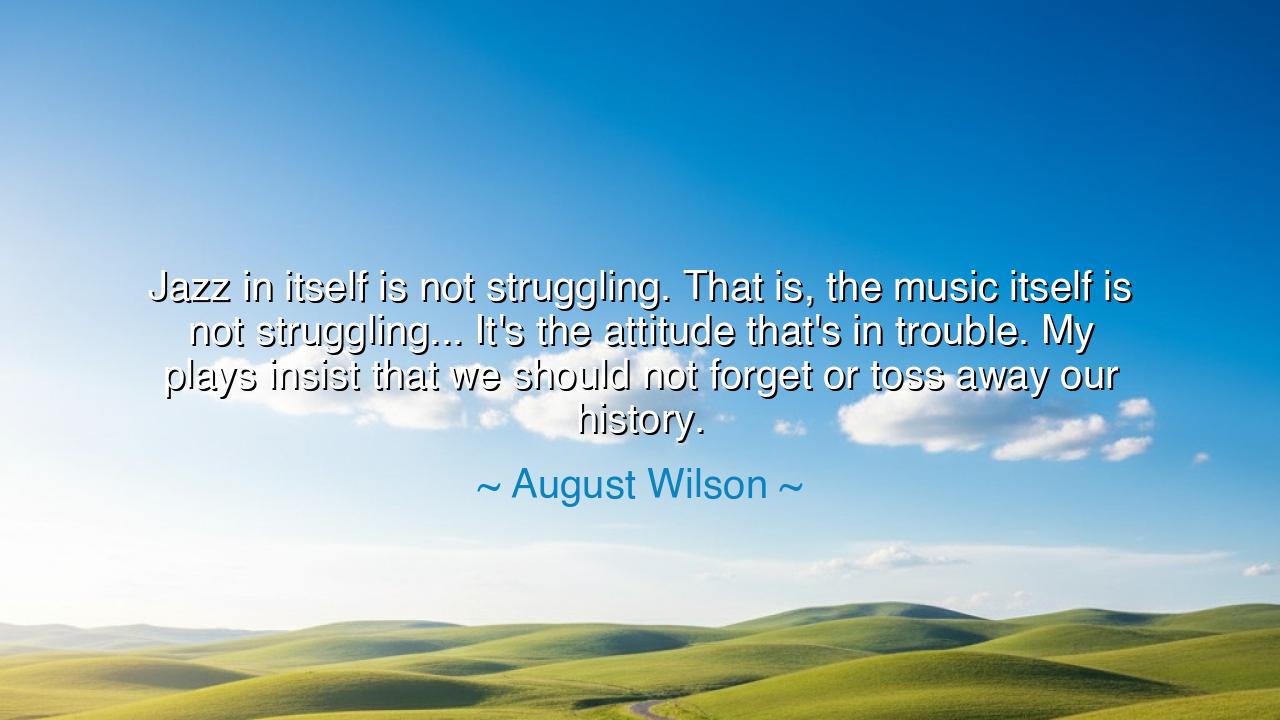
Jazz in itself is not struggling. That is, the music itself is
Jazz in itself is not struggling. That is, the music itself is not struggling... It's the attitude that's in trouble. My plays insist that we should not forget or toss away our history.






Host: The quiet of the evening filled the room, the soft light from the lamp casting a warm glow over the table. Jack sat at the table, his fingers lightly tracing the edge of his cup, reflecting on August Wilson’s words. Jeeny stood near the window, her arms loosely crossed, absorbed in thought as she processed the depth of Wilson’s statement.
Jeeny: “I’ve been thinking about what August Wilson said: ‘Jazz in itself is not struggling. That is, the music itself is not struggling... It’s the attitude that’s in trouble. My plays insist that we should not forget or toss away our history.’ It’s such a profound statement, isn’t it? He’s recognizing that the art itself—whether it’s jazz, theater, or any other form—is not inherently flawed or troubled. The struggle comes from our attitudes towards it, from how we view and interact with the past and present.”
Jack: “Yes, exactly. It’s fascinating because Wilson is showing us that art—in this case, jazz—is a form of expression, and it’s timeless. The music itself isn’t struggling—it’s the attitudes and perceptions that we impose on it that cause tension. In a way, he’s speaking to the way society sometimes rejects or misunderstands the very things that have deep cultural and historical value. It’s our attitudes toward art, history, and legacy that create the real struggle.”
Jeeny: “Right. Wilson isn’t just talking about music or plays—he’s talking about our relationship to history. The struggle is not about the art or the expression; it’s about whether we’re willing to acknowledge and honor the stories and experiences that shape us. His message seems to be that we can’t just toss away our history, our culture, or the lessons from the past. If we do, we lose something essential.”
Host: The stillness in the room deepened, as Jack reflected on how the tension Wilson speaks of isn’t just about the art form—it’s about the respect and understanding we give to the culture and history behind it. Jeeny’s gaze softened, considering how often art and culture are undervalued or dismissed because they challenge us to confront uncomfortable truths about the past.
Jack: “It makes me think about how often we treat certain cultural expressions—like jazz, or even theater—as being disconnected from the mainstream. Society tends to view them as niche or struggling because they don’t fit into the dominant narrative or expectations. But Wilson is showing us that it’s not the art that’s struggling—it’s the attitude towards it. When we fail to honor the history and the roots of that art, we miss the point entirely.”
Jeeny: “Exactly. Jazz, as an art form, is rich with history, with stories and traditions that come from a deep place. When we dismiss it or reduce it to something trivial, we’re ignoring the struggles and triumphs it represents. Wilson is reminding us that, just like the music, our history deserves respect—it’s part of our identity, and we can’t move forward without understanding where we came from.”
Jack: “And that’s why Wilson’s plays are so powerful. They force us to remember—to acknowledge the stories and struggles that have shaped who we are. It’s not about romanticizing the past, but about learning from it and allowing it to inform our present and future. If we forget our history, we lose touch with what makes us whole.”
Jeeny: “Yes, and that’s what makes art so important. It isn’t just entertainment; it’s a reflection of our culture, our experiences, and our history. When we engage with art—whether it’s music, theater, or any other form—we are invited to engage with our own identity and our collective legacy. Wilson is showing us that we can’t just ignore those things. They are what give us meaning, what help us understand who we are and where we’ve been.”
Host: The quiet in the room felt heavier now, the weight of the conversation lingering in the air. August Wilson had illuminated how our attitudes toward art, history, and culture often shape our understanding of the world. The struggle isn’t in the art itself—it’s in our willingness to honor, embrace, and learn from the history that shapes it. Jack leaned back slightly in his chair, while Jeeny’s gaze softened, reflecting on how often society overlooks the importance of history and culture, especially when it challenges the status quo.
Jack: “So, in a way, Wilson is asking us to reconsider our attitude towards history and art. Instead of seeing them as struggles or obstacles, we should see them as opportunities to learn, to connect, and to honor the legacy of those who came before us.”
Jeeny: “Exactly. History, art, and culture are not burdens—they’re treasures. By confronting our past and appreciating the art that arises from it, we open ourselves to understanding our present and shaping a more meaningful future. The struggle isn’t in the art—it’s in our willingness to acknowledge and respect the stories behind it.”
Host: The evening had fully settled in, the quiet understanding that the struggle is not in the art or the history itself, but in how we choose to engage with it. August Wilson had reminded them both that art and culture are not just reflections of the past, but living expressions that shape our present and future. The world outside had darkened, but inside, there was light—a realization that we can’t move forward without honoring and learning from the history that has shaped us.






AAdministratorAdministrator
Welcome, honored guests. Please leave a comment, we will respond soon